Steve shares how they got started from home with popcorn business and kettle corn by using the Cottage Food Laws. This family has shared a ton in their last post and this time is no exception.
I often get testimonials and stories shared to me by vendors but it’s rare when I get something so thought out, so well written and detailed – so that everyone can follow along and do the same.
A HUGE thanks to Steve & Fam!
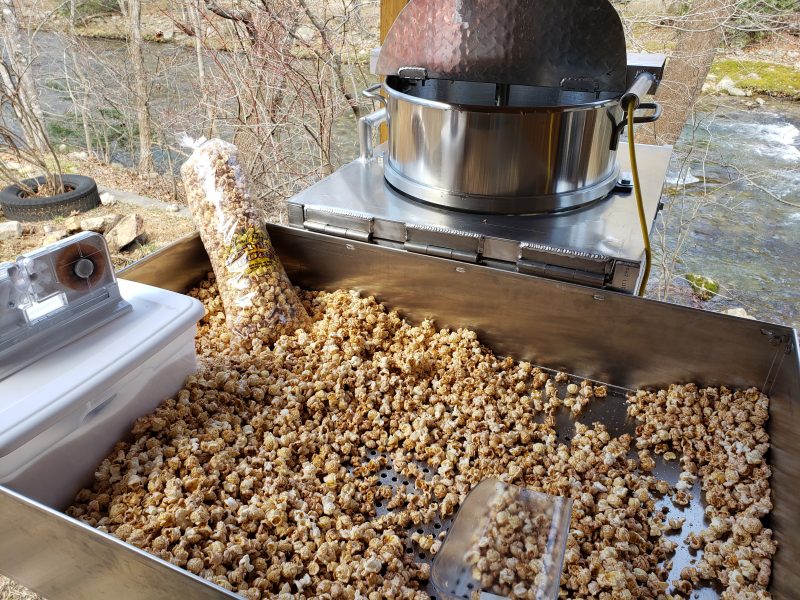
Table of Contents
POPCORN BUSINESS UNDER THE COTTAGE FOOD LAWS
By Steve Bivans
For those who like to read, I’m gonna try to capture how Payshee and I built my popcorn business under the Minnesota Cottage Food Law. KITCHEN-PROFITS
We did this for the first two or more years. It is only in the last few months of 2020 that we finally got our Temporary Seasonal Food Stand license and bought our Northbend kettle corn machine.
It’s really a kettle corn ‘kettle’ since it doesn’t really have any mechanical moving parts, at least not automated moving parts. But they call it a machine, so I’ll do so, too.
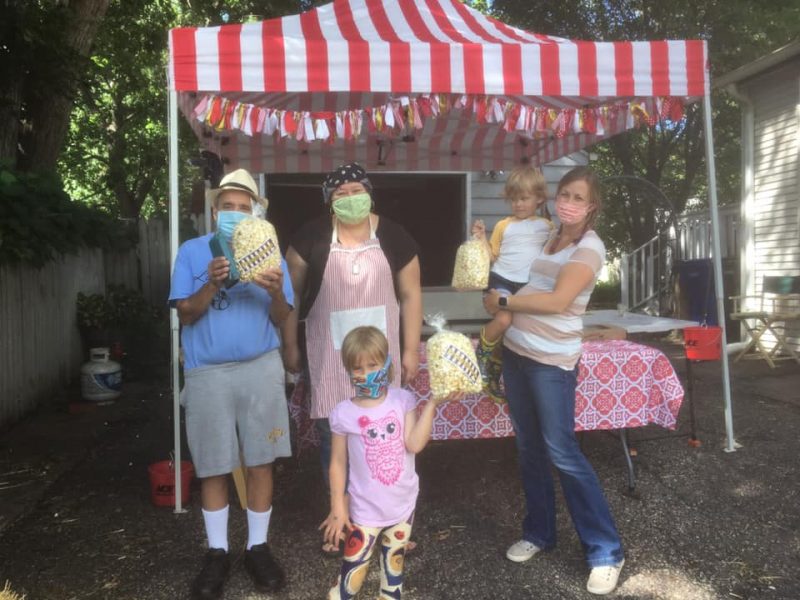
INTRODUCTION TO COTTAGE FOOD – KITCHEN INCOME
If you’re starting out in the popcorn business and you’re short on money, or you just want to dip your toe in to see how the water is, before investing thousands of dollars on a big kettle like ours, then the best way is under your state’s Cottage Food law, which I think most states have.
COTTAGE FOOD LAWS IN MINNESOTA
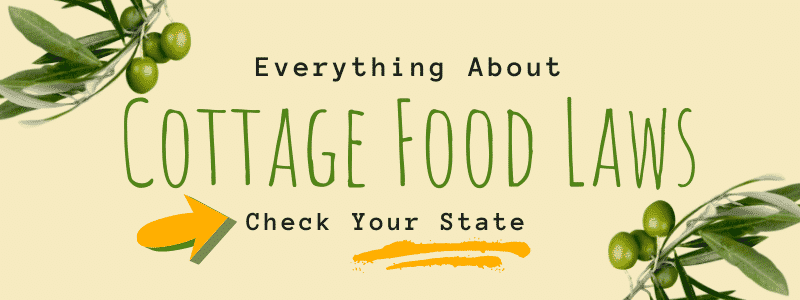
I’m sure it varies from state to state, so you will have to check to see what is required.
But in general, cottage food laws allow people to make and sell what, in Minnesota anyway, they call Non-Potentially Hazardous Foods, from their home, pre-package them, then sell them directly to the consumer, either from their home, by delivery, or somewhere outside the home, like a local farmers market, or special event.
And popcorn business fits just right!
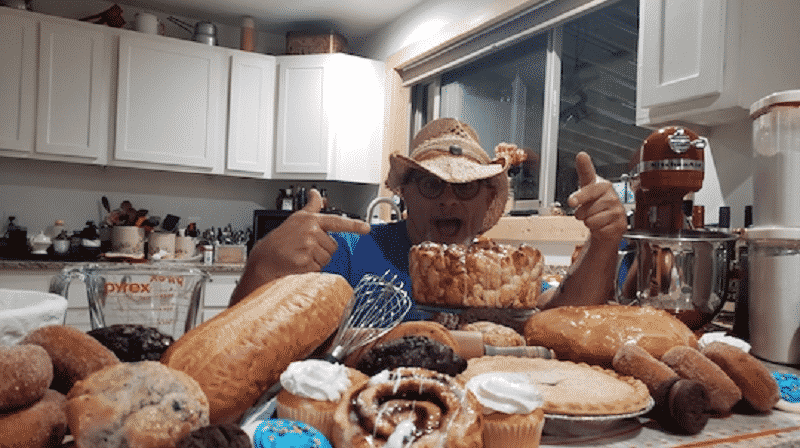
In Minnesota the cottage food maker must be the one who sells it to the end consumer. I cannot sell it, wholesale, to a store or bar and then they resell it to the consumer.
Not legally anyway. I’m not saying it doesn’t happen, but it’s not legal to do so, here.
RESTRICTIONS AND TRAINING
There is a limit to how much revenue you can sell per year, and you do have to take an online ‘course’ (takes about an hour, maybe) and a short quiz, and then you get your Cottage Food Certificate.
In MN, it’s not a license; it’s a certificate.
INSURANCE IS A MUST
But then you’re all set. I would also get some insurance (at least a million dollars worth) from your state’s farmers market association, or some far insurance place, or get it through FLIP here on hotdogcartstore.com, if you haven’t already.
*2 Million Dollars Liability – Lower Than Anyone Guaranteed
Then you’re all set to start popcorn business, kind of. Instead of writing out a long, prose explanation of all of this, I’ll try to put it into bullet points so that you can easily find what you need, and re-find it later. LearnKettleCorn.com
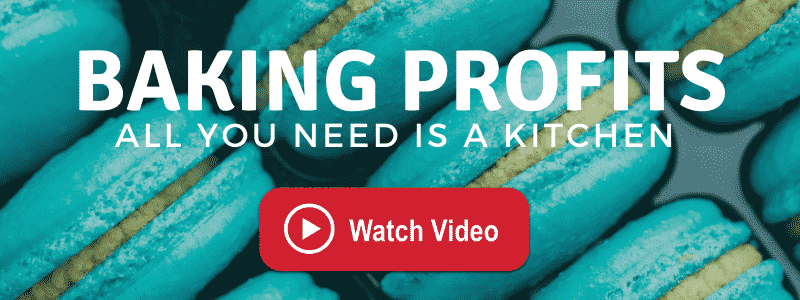
START POPPING POP CORN OR KETTLE CORN FAST
Stuff you need to start your popcorn business (or kettle corn), and the process we used…
A Popper
You need some kind of machine, or means to pop the corn. Cheapest way: a pot with a lid on the stove.
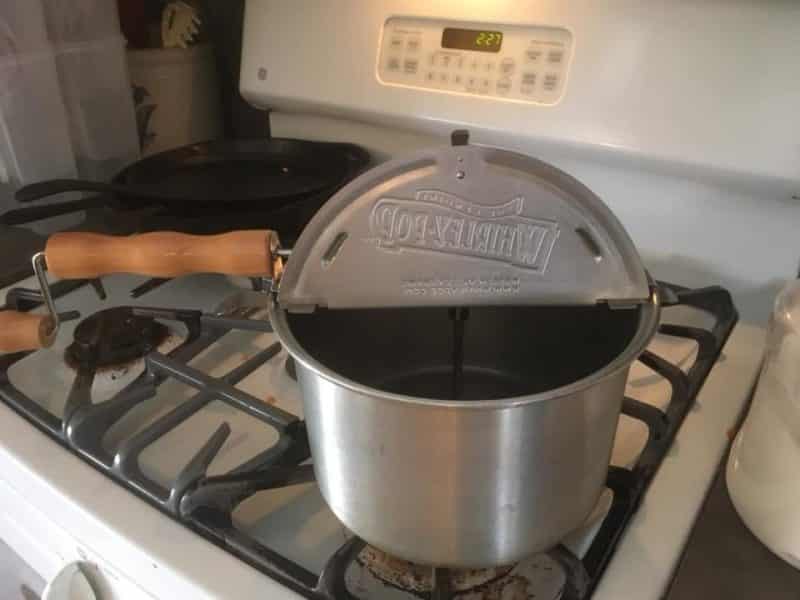
Still cheap, but better: a Whirly Pop (It has a handle with a crank that spins the popcorn around to keep it from burning.
This is what Payshee and I (and Momo) used to pop over 100 bags worth of popcorn, on the stove in THIS STORY. It works great, and you can get started with it, but it’s limited in a couple of ways:
- It will only pop slightly over a half cup of raw popcorn at a time. This will produce about a gallon of popcorn. It’s great for popping plain popcorn, which you then toss with oil and other flavors (cheese, herbs, powdered sugar recipes, etc).
- It’s NOT all that great for making traditional ‘kettle corn’ I.e., sugar coated, like you see in the big kettles. You CAN make kettle corn in it, but after a couple batches in a row, you’re gonna have to wipe, or wash it out before making the next couple batches, and then repeat.
This is not an efficient way to make a lot of kettle corn. So if you want to make kettle corn, you need a larger kettle (see lower down).
POPCORN BUSINESS – THE COUNTER TOP MACHINE
For $300-400 you can get a counter-top popcorn machine for your popcorn business, just like we got from Great Northern. This is what we used for our first two years.
And it worked great (except the day it didn’t and we had to go back to the Whirly Pop.)
- This model is the biggest you can get that still runs on 120v (standard wall outlet). It has a 16oz kettle in it, which is more than double what most home units have (usually 7oz). It will pop (depending on the popcorn) about 3 gallons of popcorn at a time and you can run it and run it for hours.
- Again, it is NOT good for making kettle corn for the same reasons as the Whirly Pop; you would have to clean it out too often. If you were making other flavors and popped them first, then you could conceivably pop kettle corn in it, but only so much of it before cleaning it.
For kettle corn production, keep reading.
KETTLE CORN KETTLE
⁃ For about $250 you can get a Caramel Corn kettle: I think we ordered ours from KaTom, here.
- These are about 40 quarts, maybe?, and designed to make caramel to mix with popcorn or other things. But they are essentially a smaller version of a kettle corn kettle. We bought one a month or so before bying our big kettle.
- I would not buy the burner unit designed for it. It’s over $700 and you can accomplish the same thing with a turkey fryer burner (we had two in our shed). The burner I used had two safety arms to hold the original pot and keep it from slipping off of the burner. (See photos).
I would get one like that, if you don’t have one. Without them, the caramel pot wont stay on the burner, since it has a rounded bottom.
NOTE: If you’re in our VendorsUnited.com group, look at the homemade kettle corn machine with a homemade stirrer. IT’S AWESOME!
- You can pop plain popcorn in this, and kettle corn. But you will need to clean it out when you’re finished making kettle corn.
A REAL COMMERCIAL KETTLE CORN RIG
Big Kettle Corn Rig: We got our 160 quart machine from Northbend Originals because we were led to believe that in MN the machine had to be NSF approved. This was before I saw Ben’s ‘liar’ videos.
Make sure you see the codes before falling for that lie. We like our Northbend machine, but if I had known, I would have bought one at KETTLECORNCASH.COM
Sifting: no matter the model, you need to have some way of sifting out the un-popped kernels from each batch.
The counter top machine has it’s own sifting holes in the bottom, with a removal tray for dumping.
The big kettle corn machines can be purchased with the sifting table to dump into, or a plastic bin with a sifting tray that fits inside it.
If you use the whirly pop, or the 40 quart caramel pot, you will need to figure out how to sift it.
You can ‘hand’ sift it, but that’s not the most sanitary way, especially during Covid, though you could do it with gloves on. It’s slow and laborious, however.
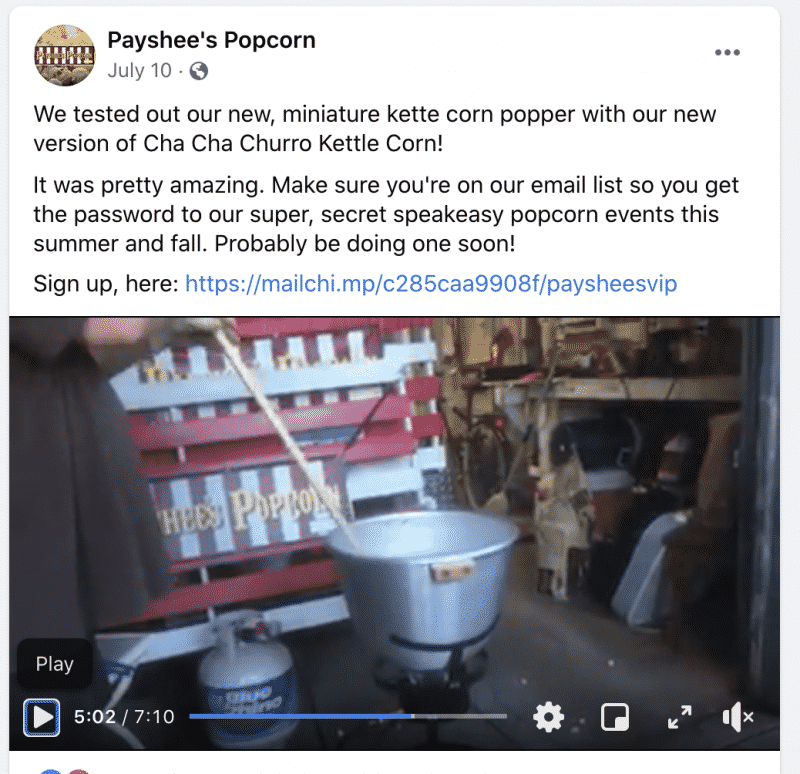
TIPS FOR POPPING POPCORN AND KETTLE CORN
• Popcorn and Oil: Must have both, or you ain’t poppin’
- We pop in only organic, cold-pressed, virgin coconut oil. Why? One, we are an ‘organic when possible’ company, and two, it makes superior tasting popcorn. Do you have to do this? Hell no. In fact, you will make more money if you do not.
- Corn oil pops popcorn just fine, and if it’s not organic, it’s a hell of a lot cheaper, like a lot. Oil is our number one product cost item. It’s entirely up to you what you use. But I would either use coconut oil, or corn oil. I would steer away from peanut oil, because of allergies.
- Popcorn. We use a local, certified organic butterfly/mushroom mix from Whole Grain Milling Company, in Welcome, MN. (Yeah, that’s the name of the town). It’s great popcorn. But it’s more expensive, like almost twice the price of regular popcorn.
Again, we’re an ‘organic when possible’ company. Our market appreciates it. Some markets may not care. Yours may not. If so, then go with either
MAGIC MUSHROOM OR MONSTER MUSHROOM
Mushroom versus Butterfly corn
There are those who will tell you that mushroom is a superior style of corn for popping. This is wrong, and a matter of opinion. But here is a breakdown of the two kinds:
- Mushroom Popcorn forms the big, round ball shape when popped. It is a favorite with kettle corn makers and with caramel corn companies, because it has LESS surface area (not more like the corn companies say), which means it takes less sugar/caramel to cover it.
This means higher profit, not tastier corn. It tastes just fine, depending on the quality of corn you buy.
- Butterfly popcorn is what you get most of the time in the movie theater, or in most of the pop-at-home jars you buy at the store. It explodes into irregular shapes with lots of ridges and way more surface area. Payshee actually prefers butterfly popcorn.
It’s more tender, but still crisp, and usually has more corn flavor. Some argue that it is too delicate for caramel coating since the little ‘wings’ might break off when stirring it.
We’ve been using it for years with our holiday caramel corn. If you’re gentle with the stirring, it does not break up and it makes an amazing product.
It will soak up more caramel, but your customer is gonna taste that, and love you for it.
That’s our two cents on the debate between the two kinds. Butterfly corn is NOT ‘old maid’ corn, just to set the record straight.
The term ‘old maids’ (which should be retired since it’s out-dated and sexist, refers to the un-popped kernels and husks that hopefully will be sifted out before bagging.)
BAGS AND PACKAGING
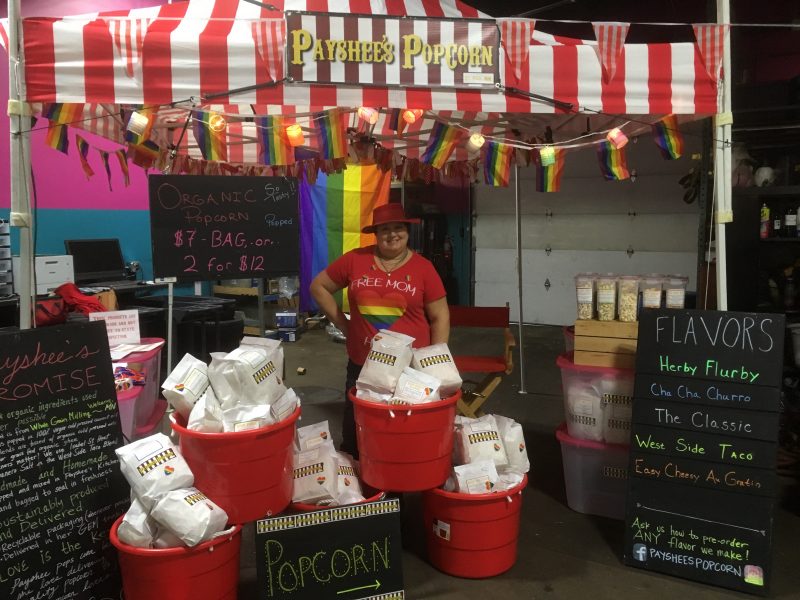
At Payshee’s Popcorn, we quickly discovered that the paper bags we used the first gig, didn’t keep the popcorn fresh, especially since we were popping it the night before, pre-bagging it, and then selling it the next day.
This is how you will be doing it, if you choose to go the cottage food route.
- So we adopted a Double Bag system – We bought a bunch of two gallon (actually just shy of two) zip lock style bags.
The popcorn went into these, and then we slipped them into our paper bags, which we had already labeled with our logo and the flavor stickers, and date stamped on the bottom (a requirement of cottage food in MN).
The paper bags: We got the paper bags from Webstrauntstore, online. The Duro 12lb bags. You might find them elsewhere, but I spent a lot of time researching them before landing on these.
They are heavier duty than some that we bought later.
Don’t skimp too much on the bag. A cheaper bag might be thinner, and tear while you’re trying to slip the ziplock bag inside it, or while trying to fold over the top to staple it shut.
Kettle Corn Bags instead?
You could just skip to using the standard kettle corn bags, the long tube ones. These you can get from Polybag LLC. Their website is probably the first website ever built, so just call them and tell them what you’re trying to do.
Personally, if you’re doing cottage food, I’d go with their 9×12 inch plain bags to start with. Put your own label on them.
FLAVORING THE POPCORN
We developed over ten different flavors for our popcorn in the first year: cheese mixes, herb mixes, sugar mixes. We’ve backed that down to the most popular seven, now.
Again, we are an organic when possible company, so we try to source organic ingredients if we can. Should you do this? If you want to, and you think your customers will pay more for it. We do, and ours do.
You can find the raw ingredients in organic options for much of it, but you have to look. If you’re really interested, let me know and I’ll point you in the right direction.
You can also find flavor powders from Gold Medal Popcorn Products. We don’t use their stuff because we like to make our stuff from scratch with cleaner ingredients, but lots of popcorn makers use their stuff.
You can find other stuff out there, if you Google it.
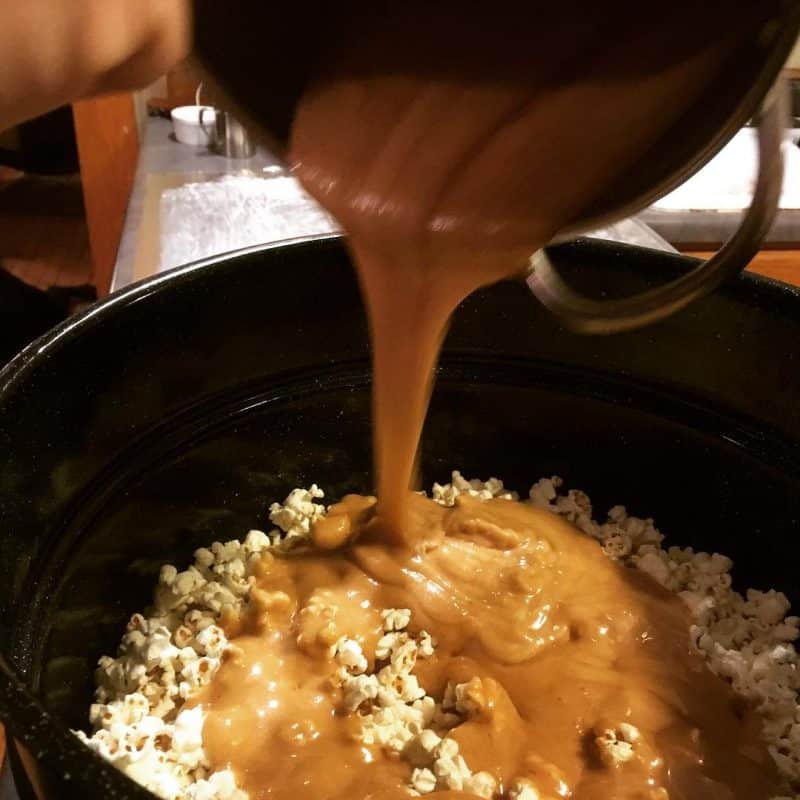
What flavors to do first?
We did a Classic (butter, salt) one, but our biggest sellers, before we offered kettle corn (sugar, salt), was the cheeses. You’ll want some kind of yellow/orange cheddar cheese flavor. Our biggest seller is our Easy Cheesy au Gratin (a smoky cheddar).
Then it’s our West Side Taco (white cheddar with taco seasoning spices). Our Cha Cha Churro was originally a powdered sugar popcorn (cinnamon, sugar, real Madagascar Bourbon Vanilla). Now we’ve converted that to a kettle corn, which is even better.
Mixing Flavors
If you can do kettle corn, do it. Most people know it and it’s a big seller. If you can’t (we didn’t at first), do powdered mixes you mix after popping.
- Cheese
- Powdered sugar mixes
- Anything else you can find in a powder form
The Magic Yellow Bowl
We mix all of our flavors, or we did, in our Magic Yellow Bowl. (See photo/video) It’s just a plastic bowl that we got really cheap years ago. It holds probably 5 quarts? Over a gallon at least.
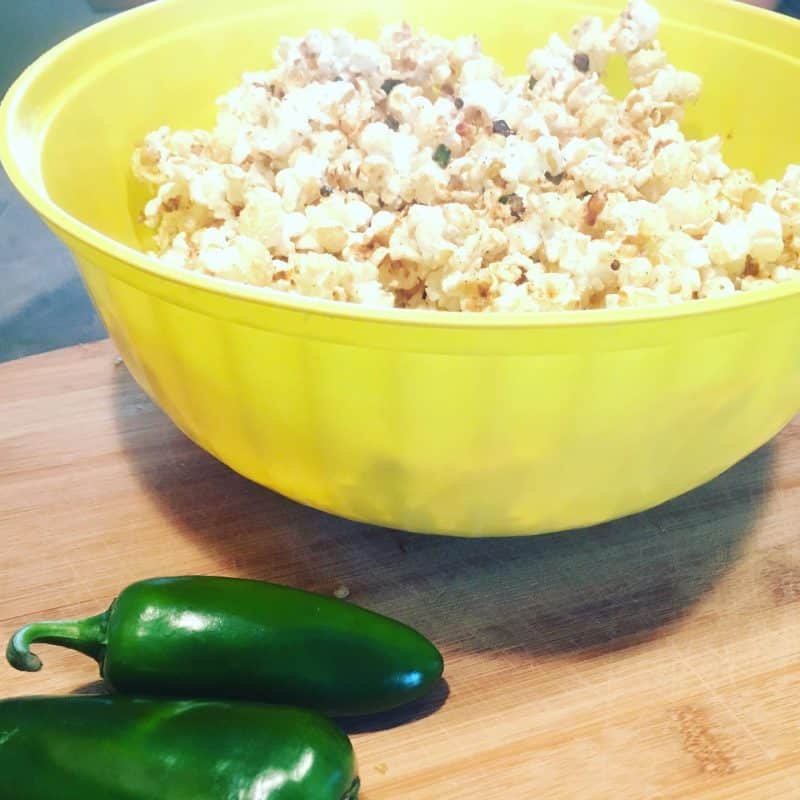
We’ve bought other bowls the same size, but most of them broke over time.
POPCORN BUSINESS: OUR PROCCESS
- Pop the corn: duh.
- Sift the Corn
- With a Whirly Pop, you’d dump the popped corn into your mixing bowl, or something with a sifting grate in it, first. If it’s the bowl, then you need two of them, so you can hand-sift the good popcorn out leafing the un-popped crap in the other to be dumped outside. Squirrels love us.
- If you have a counter top machine, it should have its own sifting holes in the bottom. You just have to empty the tray when it gets full.
- If you’re using the 40 qt caramel kettle, hopefully you’ve figured out a system for sifting it. (See the above KETTLE CORN video by Greg Sweet)
- Binding Oil: You need another oil (we use a couple different ones) to spray over the corn as you toss it. This helps to bind the powder flavorings to it so it won’t all just fall to the bottom of the bowl, or bottom of the customer’s bag. No one wants that; it’s waste.
For most flavors, we use a combo of organic avocado and sunflower oil. We put them into 16oz (now 32oz) food safe spray bottles. I spray the corn about 6 to 7 times, toss it slightly to turn it, spray it another 6-7, and then do that one more time for a total of about 18-21 sprays of oil.
- Add the Flavor: Then I spoon in the amount of cheese or other flavoring that I want (this you must learn by experimenting). For most flavors, I use about 2 to 3 tablespoons per gallon (bowl) of popcorn. Then I use the bowl to toss it over and over several times in one direction.
Then I turn the bowl about 80 degrees (not 90), and toss it some more, until it looks evenly covered.
- Bagging: Then I hold the ziplock open with my left hand, and my right while squeezing the bowl to dump it into the bag. (I’ll show this in the video). I do not seal the ziplock, yet. Ahead of time, I open up and stand up several of the white paper bags on our kitchen table, so they’re ready.
I then slip the ziplock into the paper bag. This is difficult for one person, but not impossible.
Then I seal up the ziplock, making sure to get all the air I can out of it and tuck the top down out of the way.
I then fold over the paper bag top and staple it twice.
Done! It’s ready to sell!
We usually stack all of them in big plastic bins to be loaded on our truck when we’re ready to go the next day, or whenever the market day is.
There’s obviously more things I could cover, but this has been long enough, and will give you the basic process that we used to do cottage food popcorn for the first couple years.
You can obviously graduate faster than we did, if you have the funds for a bigger rig and know that you really want to go big faster.
POPCORN BUSINESS / KETTLE CORN VIDEO
START MAKING KITCHEN CASH TODAY WITH BAKING – COOKING AND POPPING! – SEE MY VIDEO HERE

FIND YOUR COTTAGE FOOD LAWS HERE

The popcorn business is just one of the options to start a Home Cooking Business. This niche is incredibly profitable. Check our in-depth article about it, with all the available ways to go about it. You can read it HERE
 WATCH VIDEO!
WATCH VIDEO! WATCH VIDEO!
WATCH VIDEO!